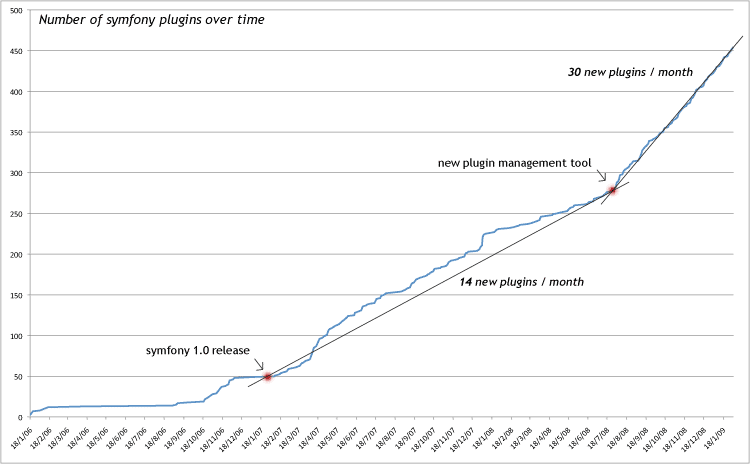Getting information from SVN with PHP
Fabien Potencier
Feb 3, 2009
Last year, I deployed a new tool to manage symfony plugins. The first goal of this tool was to simplify the process of contributing new plugins. It proved to be very successful, and I had a good feeling that the plugin creation rate was rising since then. And yesterday, I wanted to have hard numbers to back me up.
The question I wanted to answer was quite simple:
How many plugins were created per month before and after the change?
As the symfony project provides free SVN hosting for
community plugins, most plugins are actually hosted
on the official symfony Subversion repository. And thankfully, the svn command line can give you a lot
of information about your project in a very friendly format to parse: XML.
The first step is to get the log file as an XML file:
$ svn log --xml --verbose http://svn.symfony-project.com/plugins > svn_log.xml
The output is similar to something like this:
<?xml version="1.0"?>
<log>
<logentry revision="1949">
<author>fabien</author>
<date>2006-09-05T14:40:20.603942Z</date>
<paths>
<path action="A">/plugins/sfGuardPlugin</path>
</paths>
<msg>added sfGuardPlugin</msg>
</logentry>
<!-- many more entries -->
</log>
This XML file contains everything I need: the date of each commit and the paths that were modified, added, or deleted.
Reading an XML file with PHP is insanely easy thanks to simplexml:
$xml = simplexml_load_file(dirname(__FILE__).'/svn_log.xml');
The simplexml_load_file() function reads an XML file and returns an object
that can manipulated to access the various information contained in the
XML.
Iterating over the logentry and extracting data is also simple enough:
foreach ($xml->logentry as $logentry)
{
$date = (string) $logentry->date;
foreach ($logentry->paths as $paths)
{
foreach ($paths->path as $path)
{
$action = $path['action'];
$content = (string) $path;
}
}
}
Each tag is accessible as a property of the object and returns an object representing the XML child elements:
$xml->logentry;
As SimpleXML returns objects, we sometimes need to cast them to string:
$date = (string) $logentry->date;
Getting a tag attribute is as simple as using the object as an array:
$action = $path['action'];
Eventually, getting the content of a tag can be done by casting the object itself to a string:
$content = (string) $path;
Without further ado, the following code parses the XML file and detect plugin
creation by checking if the path has been created (A) and if the path is of
the form /plugins/XXXPlugin (a symfony plugin name always ends with Plugin).
$numbers = array();
$xml = simplexml_load_file(dirname(__FILE__).'/svn_log.xml');
foreach ($xml->logentry as $logentry)
{
$date = date('d/m/Y', strtotime((string) $logentry->date));
foreach ($logentry->paths as $paths)
{
foreach ($paths->path as $path)
{
if ('A' == $path['action'] && preg_match('#^/plugins/.+Plugin$#', (string) $path, $matches))
{
if (!isset($numbers[$date]))
{
$numbers[$date] = 1;
}
else
{
++$numbers[$date];
}
}
}
}
}
The $numbers array contains the days as keys, and the number of plugins created
for this specific particular day as values.
To create a graph, the array can be exported as a simple CSV file to be read by Excel:
foreach ($numbers as $date => $number)
{
echo "$date,$number\r\n";
}
It outputs the following data:
02/02/2009,1
01/02/2009,1
31/01/2009,1
30/01/2009,2
29/01/2009,1
27/01/2009,3
...
And here is the graph for the data as of today:

I was right. We more than doubled the number of plugin creation per month after the change: from 14 plugins to 30 plugins per month.